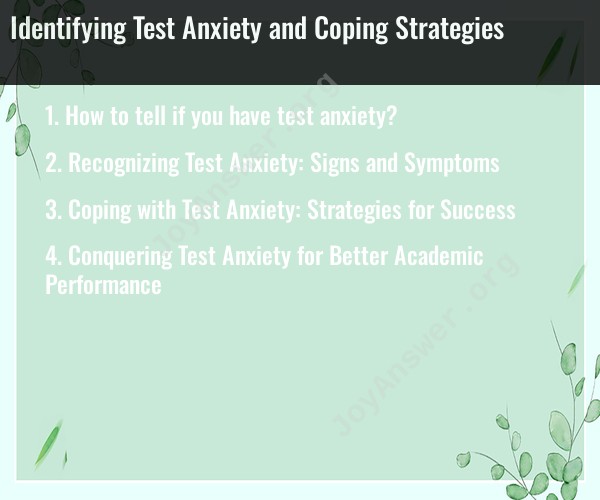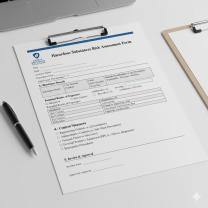How to tell if you have test anxiety?
Test anxiety is a common experience characterized by excessive worry, nervousness, and physical symptoms before or during an examination. To determine if you have test anxiety, consider the following signs and symptoms:
Physical Symptoms:
- Rapid heartbeat or palpitations
- Shortness of breath
- Sweating
- Trembling or shaking
- Nausea or upset stomach
- Muscle tension
- Headaches or migraines
Emotional Symptoms:
- Excessive worry or fear about the upcoming test
- Feeling irritable or on edge
- Restlessness
- Feeling overwhelmed or panicked
- Negative self-talk or self-doubt
- Fear of failure or disappointing others
Cognitive Symptoms:
- Difficulty concentrating or thinking clearly
- Memory lapses or "going blank"
- Racing thoughts
- Catastrophic thinking (imagining the worst possible outcome)
Behavioral Symptoms:
- Procrastination or avoidance of studying
- Repeated checking of notes or materials
- Inability to start or finish the test
- Performing poorly on tests despite knowing the material
If you experience several of these symptoms, particularly in the context of taking tests or exams, you may be dealing with test anxiety. It's important to recognize and address these symptoms because severe test anxiety can significantly hinder your academic performance and overall well-being.
Coping Strategies for Test Anxiety:
Preparation:
- Adequate preparation is key to reducing anxiety. Create a study schedule, break down your study materials, and practice with sample questions or past exams.
Stress Management:
- Incorporate stress-reduction techniques into your routine, such as deep breathing exercises, meditation, progressive muscle relaxation, or mindfulness.
Healthy Lifestyle:
- Get enough sleep, eat a balanced diet, and engage in regular physical activity. A healthy lifestyle can help reduce anxiety.
Positive Self-Talk:
- Challenge negative thoughts and replace them with positive affirmations. Remind yourself of your capabilities and past successes.
Time Management:
- Manage your time wisely during the test. Allocate a specific amount of time to each section or question, and move on if you get stuck.
Visualization:
- Visualize success and a positive outcome. Imagine yourself calmly and confidently taking the test.
Support System:
- Seek support from friends, family, or a counselor. Talking about your anxiety can be relieving and provide you with different perspectives.
Practice Relaxation Techniques:
- Practice relaxation exercises before and during the test. Deep breathing or progressive muscle relaxation can help calm your nerves.
Familiarize Yourself with the Test Environment:
- If possible, visit the test location beforehand to become familiar with the surroundings and reduce anxiety on the test day.
Take Breaks:
- During the test, take short breaks to relax and refocus. Stretch, take a few deep breaths, and then return to the questions with a clear mind.
If your test anxiety is severe and significantly affecting your academic performance, consider seeking help from a mental health professional or counselor who can provide you with personalized strategies and support. Test anxiety is a common issue, and with the right techniques, it can be managed effectively.
Recognizing Test Anxiety: Signs and Symptoms
Test anxiety is a common condition that can affect people of all ages and backgrounds. It is characterized by feelings of nervousness, worry, and dread before or during a test. Test anxiety can cause a variety of physical and emotional symptoms, including:
- Physical symptoms: Rapid heart rate, sweating, trembling, dry mouth, headache, nausea, and stomachache.
- Emotional symptoms: Feeling nervous, worried, anxious, helpless, or hopeless. Difficulty concentrating, feeling overwhelmed, and having negative thoughts about oneself or one's ability to perform well.
Coping with Test Anxiety: Strategies for Success
There are a number of things that students can do to cope with test anxiety, including:
- Prepare effectively: The more prepared a student is for a test, the less anxious they are likely to feel. Students should start studying early and create a study schedule that works for them. They should also make sure to get enough sleep and eat a healthy breakfast on the day of the test.
- Use relaxation techniques: Relaxation techniques, such as deep breathing and meditation, can help to reduce anxiety and improve focus. Students can practice these techniques before and during the test.
- Challenge negative thoughts: Test anxiety often involves negative thoughts about oneself or one's ability to perform well. Students should challenge these negative thoughts by replacing them with more realistic and positive thoughts.
- Take breaks: If a student is feeling overwhelmed during the test, they should take a short break to clear their head and refocus. They can walk around, stretch, or take a few deep breaths.
Conquering Test Anxiety for Better Academic Performance
Test anxiety can have a negative impact on academic performance. Students who are anxious about tests may be more likely to forget information, make mistakes, and score lower on tests.
There are a number of things that students can do to conquer test anxiety and improve their academic performance, including:
- Seek professional help: If a student is struggling to cope with test anxiety on their own, they should seek professional help from a therapist or counselor.
- Get accommodations: Students with test anxiety may be eligible for accommodations, such as extra time on tests or a quiet testing environment.
- Develop a test-taking strategy: Students should develop a test-taking strategy that works for them. This may involve creating a study schedule, using relaxation techniques, and challenging negative thoughts.
- Practice positive self-talk: Students should practice positive self-talk before and during tests. This can help to boost their confidence and reduce their anxiety.
By following these tips, students can conquer test anxiety and improve their academic performance.











